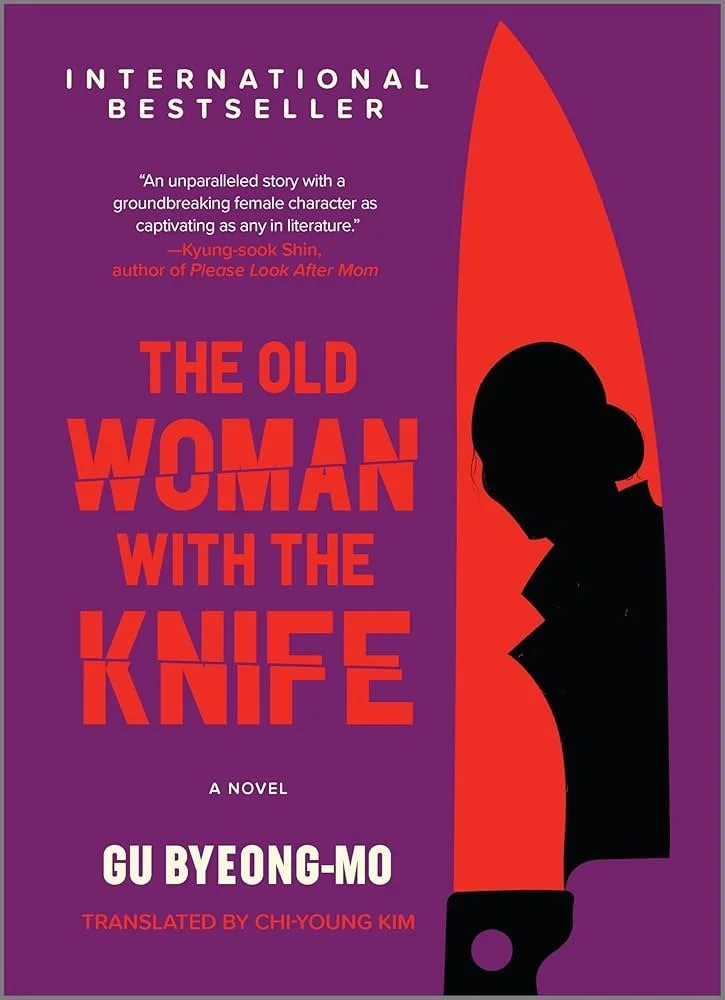The old woman with the knife. Starsza pani z nożem by Gu Byeong-Mo
“People think an old person can’t finish their life with a clear mind, that they easily get sick and spread disease. So no one wants to take care of them. That’s how people think of all living beings. (…) So when the time comes, leave. Go where you want. Do it before they classify you as waste — even though you’re still alive.”
For me, this book is about debt and karma—how your past eventually catches up with you, and how some debts, especially those rooted in kindness, stay with you forever. There’s something heartbreakingly beautiful about how being shown compassion can make you realize just how alone you are.
One of the strongest themes here is aging. There is also this unspoken societal expectation about how elderly people should behave. As the book says:
“An elderly woman reading the Bible on her knees in the subway, following each verse through a magnifying glass, doesn’t seem strange to anyone. No one pays her any attention — unless she grabs a stranger’s arm and starts shouting about Jesus, heaven, nonbelievers, and hell… With a normal appearance and behavior that meets social expectations, a hunched-over old woman reading enlarged letters through a magnifying glass doesn’t attract any attention from passengers.”
This line also serves as a quiet wink from the author: the most “average” looking people might be the ones carrying the darkest secrets. If something happens, you wouldn’t even be able to describe them. They blend in.
Getting older means becoming more invisible—and lonelier too. But it also means becoming more aware that the end is near. And yet, there’s a bit of dark humor here too. The main character is so aware she might die any day that she rearranges her home so her dog can escape if she dies suddenly. She gives her dog very practical instructions:
“Listen. If you wake up one morning and I’m lying there not moving, even when you nudge and bark at me — that means I’m already dead. I want you to live. So you have to go out the window. Don’t look for anyone to help me.”
And here comes the quote that stayed with me — a punch straight to the heart:
“People think an old person can’t finish their life with a clear mind, that they easily get sick and spread disease. So no one wants to take care of them. That’s how people think of all living beings. (…) So when the time comes, leave. Go where you want. Do it before they classify you as waste — even though you’re still alive.”
This is one of the many reasons why I strongly believe in taking care of your body while you’re young — stay active, exercise, so you can remain independent later in life.
I was truly drawn into the story. It has everything: a compelling plot, strong twists, a fascinating main character. But I have to admit I was a bit disappointed with the ending. I expected something different — more closure, maybe even justice.
Throughout the book, there’s a strong message about how society expects us to behave, dress, and speak a certain way. If you follow those silent rules — blend in, stay quiet — you’re left alone. You’re “safe.” But step out of line, and suddenly people are uncomfortable, even hostile. And the older you are, the easier it is for others to erase you completely.
This novel also shows how society sidelines older people, treating them like they’re no longer relevant. The main character may be physically weaker, but she’s far from powerless. It’s a simple act of kindness that gives her a new will to live — to keep going, and to fight for someone else. That warmth, that brief connection, becomes her reason to live.
And finally, this quote:
“Thanks to the 24-hour news cycle, one event would be repeated at least seven times in ten different places… As the media amplified certain stories—whether for profit or to distract from real political issues—people gradually grew numb and stopped paying attention, becoming vulnerable to danger, until something even more shocking happened.”
It’s so true. Disinformation is everywhere — not just with AI influencers, but even journalists seem to be sharing opinions instead of facts. News isn’t about truth anymore; it’s about clicks.
